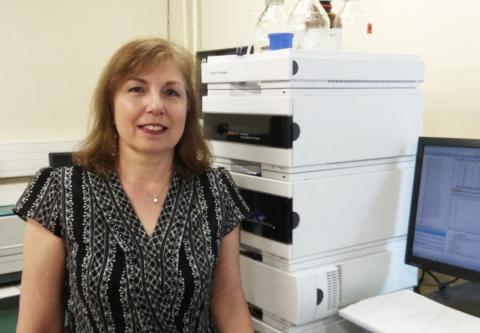
Hynd Remita: Materials of the future
Hynd Remita is a research director at the Laboratory of chemistry and physics (Laboratoire de chimie-physique, LCP - CNRS/Université Paris-Sud). A physico-chemist, she is a specialist in radiation and nanomaterials chemistry, and is interested in its environmental and medical applications. Coordinator of the Momentom Strategic Research Initiative (Molecules and Materials for the Energy of Tomorrow)*, she is also at the initiative of two innovative startup in the nanomaterials field.
Within the Laboratory of chemistry and physics (Laboratoire de chimie-physique, LCP - CNRS/Université Paris-Sud), Hynd Remita is part of the TEMIC (Electron transfer in a condensed medium) group, which includes 17 researchers and teacher-researchers. Its objectives are to develop metallic, semiconductor or hybrid nanomaterials with multiple applications.
Transforming gold
"Thanks to our technical platforms - such as Elyse, a picosecond electron accelerator unique in Europe, or our panoramic gamma irradiation source - we generate and study metallic, semiconductor or polymer nanoparticles. Radiolysis - the use of high-energy radiation - allows the synthesis of nanomaterials of controlled size, shape and composition. For example, gold adopts new properties at the nanoscale : they can be optical by changing colour, catalytic in order to convert carbon monoxide into carbon dioxide, or magnetic," she explains.
Cleaning up water
Hynd Remita was very early on motivated by the application aspects of its research and collaborated with manufacturers. She first worked with Agfa and filed 7 patents in the field of silver photography and offset, then with Rhône-Poulenc (now Rhodia and Solvay) for the automotive sector and the catalytic converter. Today, the researcher is turning to environmental and medical applications for which she is developing eco-friendly materials. Her controlled syntheses of nanomaterials are thus applicable to photocatalysis for water pollution control and to the generation of dihydrogen, the green fuel of the future. "Tthese nanomaterials have the ability to clean up water or even air in interaction with solar energy. They can also generate dihydrogen by dissociating the water molecule."
Recently, Hynd Remita has also developed nanoparticles with antibacterial properties or for cancer treatment, in collaboration with the teams of Ruxandra Gref and Sandrine Lacombe respectively at the Orsay Institute of Molecular Sciences (Institut des sciences moléculaires d'Orsay, ISMO - CNRS/Université Paris-Sud).
Nanoparticles with surprising properties
A first start-up is being created and is the result of a collaboration with Olivier Pluchery, professor at Sorbonne University. "Bichromatics develops bichromatic nanoparticles that appear in two different colours depending on the lighting. There are many applications: luxury packaging, counterfeiting..." Another project is in pre-maturation. "Its aim is to develop conductive and eco-compatible inks based on abundant elements, resistant to oxidation and inexpensive for printed electronics. These applications are of interest to electronics, robotics, aeronautics and even to the textile industry," says Hynd Remita, who hired Anaïs Lehoux to work on the project.
A flawless investment in Saclay
Hynd Remita defended her thesis in 1990 at Université Paris-Sud and did a post-doctoral fellowship in Canada. She then got a position as temporary teaching and research attaché at Université Paris-Sud, and joined CNRS in 1994. Since then, she has been involved in all aspects of her profession, including teaching and science outreach. Each year, she welcomes different audiences with an unfailing desire to pass on her knowledge and to develop scientific curiosity. Despite her investment in research and her participation in several international conferences per year, Hynd Remita also devotes herself to Université Paris-Saclay, which "opens me to many interactions with colleagues from all disciplines."
*The next IRS Momentum workshop will take place on June 25, 2019 at Synchrotron Soleil.
